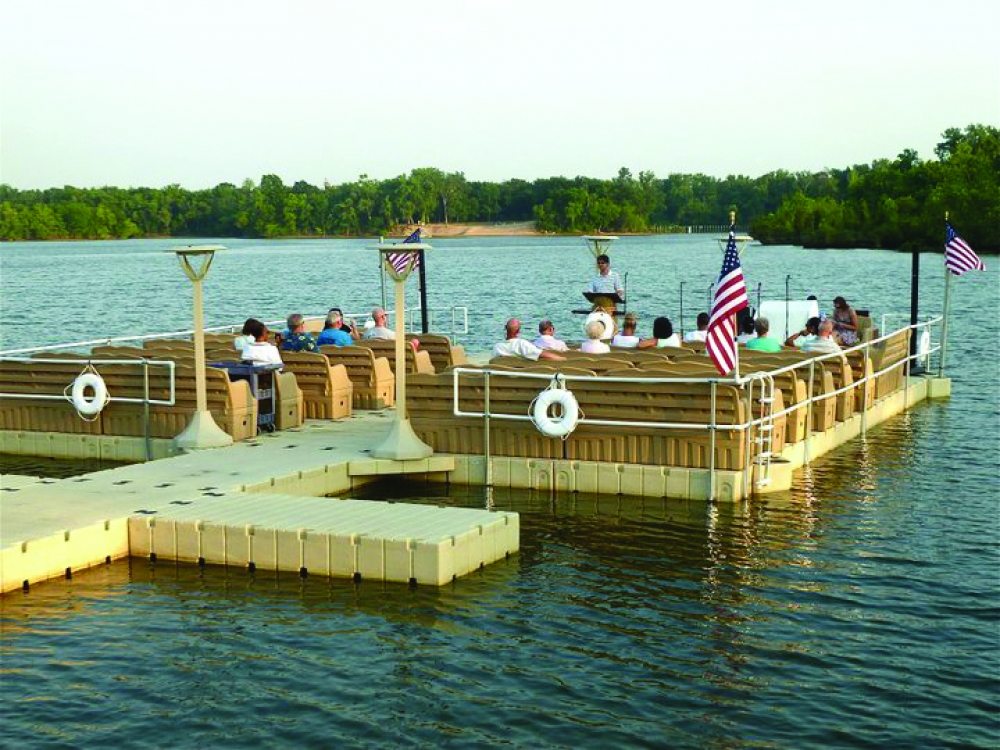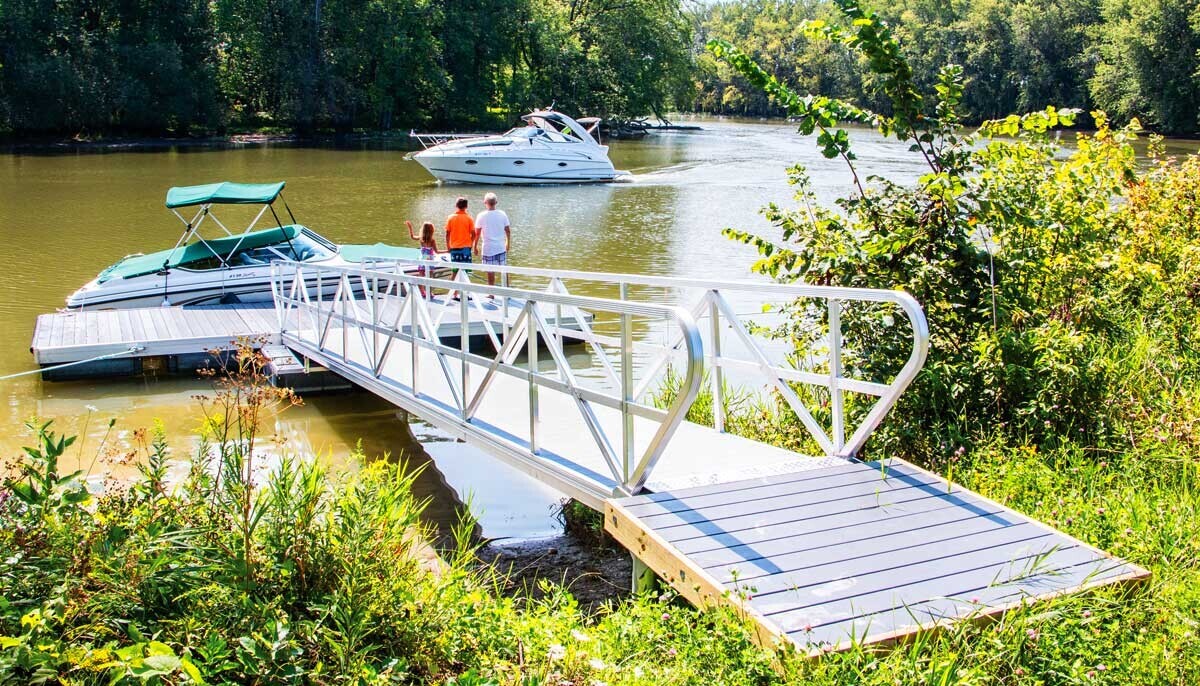Crafting Customized Solutions: Why a Floating Dock Builder is Necessary for Special Demands
Crafting Customized Solutions: Why a Floating Dock Builder is Necessary for Special Demands
Blog Article
Floating Docks: The Perfect Option for Versatile Water Access
Floating docks present a compelling solution for a range of water access requires, supplying convenience that transcends standard mooring alternatives. The modular nature of floating docks facilitates modification, providing to certain demands.
Benefits of Floating Docks
Floating docks deal many advantages that improve water gain access to for different applications. Their capability to increase and drop with changing water levels makes them particularly advantageous in environments with fluctuating trends or seasonal variations. This flexibility makes sure that vessels can conveniently anchor without issue for the water's depth, supplying a reputable platform for recreational, business, and industrial uses.
Additionally, floating docks are usually created from long lasting materials that resist rust, making them appropriate for long-term use in marine settings. Their installation is typically less invasive than traditional set docks, minimizing the environmental impact and facilitating quicker implementation (floating docks). This flexibility permits for much easier relocation or reconfiguration according to user needs or ecological changes
Security is another vital benefit; floating docks can offer secure gain access to for individuals getting off or boarding from watercrafts and minimize the danger of mishaps connected with unstable surfaces. They can be made to suit a variety of devices, such as fenders and cleats, enhancing functionality. In general, floating docks stand for an effective option for boosting water gain access to across varied sectors while advertising safety and environmental sustainability.

Kinds of Floating Docks
Different sorts of floating docks accommodate various requirements and settings, each made with details attributes to optimize performance. One of the most usual types consist of modular docks, which contain interlocking sections that enable very easy modification and expansion. These docks are optimal for leisure use, as they can be tailored to fit different boat dimensions and water problems.
One more preferred choice is the stationary floating dock, which stays anchored in position however drifts with altering water degrees. dock company. This type is specifically suited for areas with very little tidal changes, giving secure access for fishing or swimming. Additionally, there are drive-on docks, which feature a sloped style that enables boats to quickly drive on and off, making them appropriate for individual boat and smaller sized vessels
For industrial applications, durable floating docks are offered, built from strengthened products to stand up to considerable tons and extreme aquatic settings. Environment-friendly floating docks utilize lasting products and styles to reduce environmental influence, usually integrating functions like greenery to sustain regional wildlife. Understanding the various types of floating docks guarantees that users can pick one of the most suitable solution for their details demands.
Setup Refine Introduction
A successful installment of floating docks needs careful preparation and attention to information to ensure ideal performance and safety. you could try these out The first action entails evaluating the site conditions, including water deepness, existing, and possible challenges. This assessment informs the choice of the suitable dock products and design customized to the specific setting.
Next, getting required authorizations is important, as many territories have regulations pertaining to building and construction on water bodies. The installation can continue as soon as consents are protected. Begin by preparing the structure, which may include anchoring systems or pilings customized to the dock kind and local problems.
Adhering to the foundation configuration, set up the dock areas according to manufacturer specs. Make certain that all components are securely secured and lined up to hold up against environmental tensions. Setting the dock in the marked location, guaranteeing it is level and stable.

Upkeep Tips and Ideal Practices
After Continue the installment procedure is total, ongoing upkeep plays an essential function in making sure the longevity and functionality of floating docks. Regular inspections need to be performed to determine any indicators of degeneration, wear, or damage - floating dock builder. Look for any kind of loose installations, fractures, or splitting up in the dock sections, as these can endanger architectural honesty
Cleaning up the dock is important to get rid of debris, algae, and various other build-up that can influence its appearance and safety and security. Use a mild pressure clean periodically to keep cleanliness without creating damage to the surface area. Additionally, applying a safety sealant every couple of years can assist improve longevity and stand up to ecological wear.
Take note of the mooring lines and supports, ensuring they are safe and free from deterioration. Change any type of degraded elements immediately to stay clear of risks. Seasonal adjustments may additionally be needed; during extreme weather, repositioning or reinforcing the dock can prevent damages.
Applications for Floating Docks
Floating docks serve a multitude of applications, satisfying both entertainment and commercial needs. In leisure settings, they provide smooth access to waterways for tasks such as boating, fishing, and swimming. Their adjustable nature enables installation in varying water degrees, making sure secure and risk-free accessibility no matter tidal changes.
Readily, floating docks are indispensable for marinas and beachfront services. They promote the docking of vessels, making it possible for effective filling and dumping of goods. Their modular layout allows for simple expansion or reconfiguration to suit transforming business needs, making them optimal for boat leasings, trip operations, or angling charters.
Additionally, floating docks are utilized in environmental applications such as marine study and habitat repair. They can serve as systems for clinical researches, monitoring water top quality, or conducting wildlife surveys without disturbing delicate ecosystems.
In commercial contexts, floating docks are employed in construction jobs, providing access to hard-to-reach locations for equipment and employees. Their flexibility, durability, and very little effect on the environment make them an optimal selection for a wide variety of applications, improving both capability and ease of access in various water-based settings.
Final Thought
To conclude, floating docks stand for an optimal option for varied water accessibility needs, owing to their flexibility, durability, and modular design. These structures promote safe mooring for various applications while reducing environmental effect during installation. The lowered maintenance demands further enhance their practicality. Because of this, floating docks serve as a valuable property for leisure, business, and ecological tasks, making sure reputable accessibility to waterways and promoting sustainable techniques in water settings.
Floating docks present an engaging solution for a range of water accessibility requires, providing adaptability that goes beyond traditional mooring choices.Floating docks deal numerous advantages that enhance water gain access to for different applications. On the whole, floating docks represent an go to this web-site efficient option for boosting water accessibility throughout diverse sectors while promoting security and environmental sustainability.
Another preferred alternative is the fixed floating dock, which remains secured in place yet floats with transforming water levels.In final thought, floating docks stand for an optimum service for diverse water accessibility needs, owing to their versatility, longevity, and modular style.
Report this page